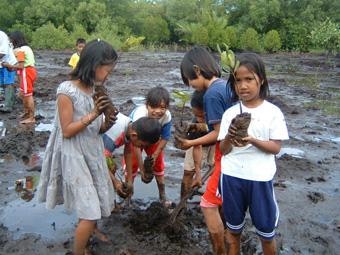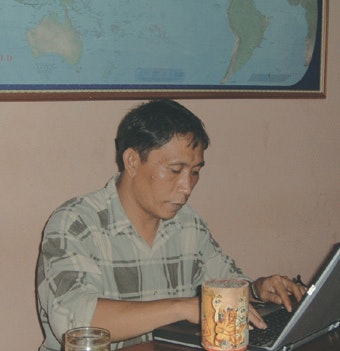Community-Based Mangrove Management and Rehabilitation in North Sulawesi Province, Indonesia
Indonesia’s coastline was historically an important mangrove forest area, and most of what remains – some 5,000 hectares – lie within North Sulawesi Province. To date there has been little effort to protect these fragile habitats and as the result there has been significant degradation of mangroves due to the construction of shrimp ponds and local harvesting for wood for boats, building, and firewood. Yet despite their importance to local people, proper management of the mangrove ecosystem and efforts to rehabilitate what remains are still in a concept form. The economic instability of Indonesia furthermore undercuts efforts to reduce the reliance of local people on natural resources.

Aquatic expert and lecturer, Dr. Rignolda Djamaluddin is Director of KELOLA, a Natural Resources Management team, and leads a project to improve the management and rehabilitation of North Sulawesi Province’s last mangroves. Through the project, Rignolda is working with local people to develop rehabilitation programs to restore the mangrove habitat and halt further destruction. He is teaching local people why mangroves are physically important in protecting coastal areas. With the help of Mangrove Action Project, Rignolda has constructed a mangrove centre, known locally as Daseng Lolaro, at Tiwoho Village, North Sulawesi. The centre contains a library, meeting rooms, laboratory, waste water garden, and a mangrove nursery, as well as rooms for workshops and training. Near the centre, 60 hectares of mangrove are being restored as a demonstration site for physical restoration of previously disused shrimp ponds.
The main target of the project is the local community living in the northern part of the Province, Likupang Sub-District. Local government institutions – in particular those are responsible for mangrove management – are also a key focus. North Minahasa Office of Forestry and Tourism and North Sulawesi Rehabilitation Office is being involved to increase institutional capacity for conservation, as are local NGOs and university conservation groups.
It is hoped that through training and hands-on conservation, a basic knowledge of how mangroves function and how to restore them will be gained, which – with the addition of alternatives for income generation – will lead to sustainable use.




